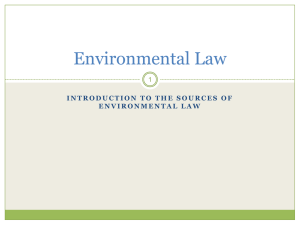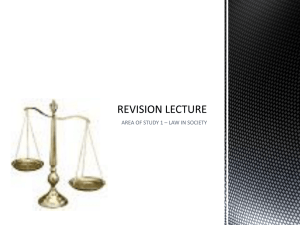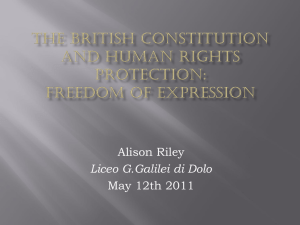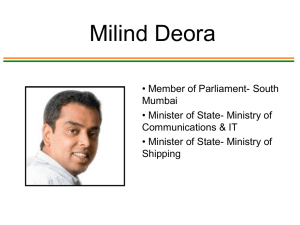parliamentary sovereignty
advertisement
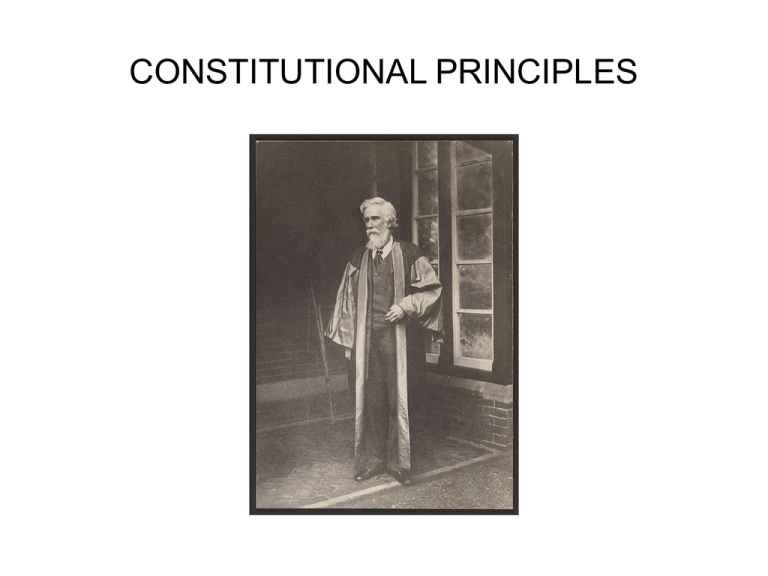
CONSTITUTIONAL PRINCIPLES Sir William Wade (1918-2004) Sir Ivor Jenning(1903-1965) JAG Griffith (1918-2010) Introduction ‘The constitution of the UK lives on, changing from day to day the Constitution is no more and no less than what happens. Everything that happens is constitutional. And if nothing happens that would be constitutional also.’ (Griffith ‘The Political Constitution’). As there is no codified constitution Dicey recognised that it is based on the principle of the sovereignty of Parliament and the rule of law. Separation of powers has emerged as a principle of increasing importance in the contemporary constitution. PARLIAMENTARY SOVEREIGNTY Qualifications of absolute power of monarch: Magna Carta 1215 Statute of Proclamations 1539 Case of Proclamations (1611) Dr Bohnam’s Case (1610) "The principle implicit in the Bill of Rights 1689 is the supremacy of Parliament in the law". Parliament consists of House of Commons, House of Lords and the Monarch. Dicey and legal sovereignty (1) Parliament recognised as the supreme law making body with unlimited law making capacity. (2) No Parliament can bind its successors doctrine of implied repeal, namely, later statute prevails over earlier one: see Ellen Street Estates v Min of Health (3) No other bodies can challenge the validity of legislation. Challenging statutes in court The courts are often called upon to interpret legislation but they do not have the power to challenge primary legislation. Enrolled act rule s.9 Bill of Rights 1689 Edinburgh & Dalkeith Railway Co v Wanchope (1842) British Railways Board v Pickin [1974] unsuccessful attempt to argue that statute invalid because of a defect in procedure followed in Parliament. Jackson v AG [2005] Hunting Act 2004 challenged in the courts. Jurisdiction acknowledged to determine the validity of an act of Parliament. ‘The judgment is an affirmation of the principle of sovereignty and it recognised that the courts have a subordinate role to Parliament.’ Express and implied repeal Sovereignty means that, in theory at least, no Parliament can bind its successors. Under the Doctrine of Implied Repeal a later statute prevails over an earlier one. See Ellen Sreet Estates v Min. of Health [1934] Maughan LJ: "The legislature cannot, according to our constitution, bind itself as to the form of subsequent legislation and, and it is impossible for Parliament to enact that in a subsequent statute dealing with the same subject-matter there can be no implied repeal”. Implied repeal however has been modified by UK membership of the EU under the ECA 1972 and by the HRA 1998. This is in the sense that these pieces of legislation continue to be valid and their provisions in effect over ride subsequent pieces of domestic legislation. European Union Law Bulmer v Bollinger [1974] - Lord Denning referred to EU law as: ‘an incoming tide which cannot be held back’. European Communities Act 1972 – s.2 (1), s.2 (2), s.2 (4) and s.3 (1) Direct applicability of EU law in the UK Articles and regulations without further action, directives need to be implemented domestically. S.3(1) decisions of ECJ used to interpret e.g. Costa ENEL case and EU supremacy doctrine. R v S of S for Transport ex p Factortame Ltd (No 2) [1991] The case concerned fishing rights. The Merchant Shipping Act 1988 s.14 had established a new register of UK vessels which was only open to those whose who satisfied certain conditions, e.g., that vessels were at least 75% UK owned. Claimants who were Spanish argued that the Act infringed the Treaty on grounds of discrimination on the basis of nationality. House of Lords held that Community law had to be interpreted as meaning that a national court must set aside any measure of national law which precludes it from granting interim relief to protect rights which had been established under Community law. See Lord Bridge’s judgment. The courts clearly accepted the supremacy of EU law and the modification of the Diceyan approach. It spells the end of the doctrine of implied repeal. The nature of parliamentary sovereignty How did sovereignty come to be recognised. Different views on this. It is argued by Jennings and Heuston that there is a common law acceptance of Parliamentary sovereignty by the courts which is implicit in the constitution. But for Wade this is not something given by Parliament or taken away by Parliament rather it is a rule of recognition by which the courts recognise the Sovereign will of Parliament. Wade argues that the supremacy of Parliament is due to a rule beyond the reach of Parliament. If this rule was not followed there would be a ‘revolutionary’ change and the end of sovereignty. UK Constitution and entrenchment • Can sovereignty be limited so that a current Parliament binds its successors? • Two recent examples the Fixed Term Parliament Act 2011 (5 years between elections) and the European Union Act 2011 (referendums before extension of EU law). • Manner and form approach (AG for NSW v Trethowan). • Is there authority to suggest that a special procedure in such an act will be binding. Earlier act prescribes (e.g. two thirds majority plus referendum) to repeal provision. This is not subsequently followed in future legislation which is intended to repeal the decision. Will the subsequent legislation be valid? Political sovereignty Dicey also recognised that political (as opposed to legal) sovereignty lies with the electorate and is associated with representative and responsible government. Based on the mandate i.e. an elected government has authority to govern and to introduce its manifesto promises. RULE OF LAW Dicey’s second major principle which qualifies the unlimited nature of parliamentary sovereignty: ’a bridle for Leviathan’. ‘The rule of law is both a legal rule and a political ideal or principle of governance comprising values that should be reflected in the legal system and should be respected by those concerned in the making, development and enforcement of the law’ (Turpin and Tomkins). In other words the rule of law is the essential part of ‘constitutionalism’. But it also meant that the courts exercise a control function over Parliament and government e.g. through the emergence of judicial review. Defining the rule of law (1) The predominance of regular law over arbitrary power. It means there can be no punishment without law Judicial resistance to arbitrary executive action/Royal authority e.g. Entick v Carrington (1765) insistence on due process - overlaps with requirements of Article 6 ECHR. Congreve v Home Office [1976] qualifies improper exercise of discretionary powers (2) No-one is above the law - equality before the law. Everyone including the executive organs of the state are under the jurisdiction of ordinary courts and subject to the law. Exceptions exist: parliament, diplomats, public interest immunity e.g. Conway v Rimmer [1968], exemptions under the Freedom of Information Act 2000. (3) The constitution is a result of the ordinary law according to Dicey the common law provides legal protection for the individual. M v Home Office [1994] modern example of the courts standing up to executive authority (while the application of an asylum seeker was before the court he was deported in breach of an express undertaking to the judge. A finding of contempt was upheld against the Crown by the HL) but there have been many examples of the courts not standing up to the executive branch, especially in wartime e.g. Liversidge v Anderson [1942] Rule of Law and judicial oversight function Under the common law the courts apply the rule of law to ensure that public authorities act lawfully. Citizen rights have been protected under the common law. Ridge v Baldwin [1964] - important aspects of administrative law developed by the judges e.g. principles of natural justice. Consistent with the notion that the common law infused with concepts of impartiality (e.g. Trevor Allen). Negative liberty - citizens are free to do anything which does not break a specific law. The HRA incorporates a charter of positive rights. Whitehall model: ‘The Government controls Parliament and not Parliament the government’. Majority party in the House of Commons uses whips/managers to steamroller through legislation (which may be unpopular). MPs continue their support because losing a vote could lead to an election and fall of government. Lord Hailsham described this as ‘elective dictatorship’. Crucial to understanding how the system operates. Separation of Powers No formal separation of powers e.g. members of government must be members of Parliament. Until recently the highest appellate court was part of Parliament. Lord Chancellor used to conflict by being part of all three branches. A-G as government law officer also responsible for taking decisions to prosecute requiring neutrality. Constitutional Reform Act 2005 Constitutional Reform Act 2005 recognises separation of powers by: (1) Placing Lord Chancellor and other ministers under a statutory duty to uphold the separation of powers. (2) Removing the anomalies relating to the position of the Lord Chancellor. (3) Introducing a UK Supreme Court to replace the appellate committee of the House of Lords. (4) Changed the method for the appointment of judges at all levels, including the introduction of a judicial appointments commission. Human Rights Act • One of the effects of the HRA has been to incorporate the rights contained in the ECHR into UK domestic law. • Article 6 in particular had obvious implications because of the previous lack of separation of powers. • For example until 2000 the Lord Chancellor was able to sit as a judge on the appellate committee of the House of Lords. • Separation of powers now recognised as an important constitutional principle. Contrast the USA, Italy Marbury v Madison (1803) The US Supreme Court determines whether laws are in conformity with constitution. The courts have the final word, not Congress or the President i.e. where there is judicial supremacy. * Danger of politicising the judiciary * Note that the Human Rights Act 1998 recognises supremacy by only allowing declarations of incompatibility (s.4) which refers the matter back to Parliament Conclusion UK has an uncodified constitution increasingly defined by statutes i.e. recent trend towards codification Constitution easily changed as Parliament is sovereign and no special procedure is necessary. Sovereignty has been diluted (no implied repeal) post EU and HRA. Rule of law is an important principle which has developed alongside parliamentary sovereignty on the assumption that the courts are a counter-balance to Parliament. Judicial review as a manifestation of the rule of law is a significant check on government but the courts have no power to override Parliament.


